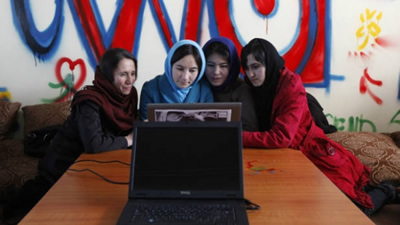Afghanistan’s security challenges and political uncertainty continue to impede the growth of e-commerce, but its dynamic youth-driven IT sector could help make the difference, a just-released UNCTAD assessment of the country’s readiness to engage in eTrade says.
The government and donors are waking up to the value of a digital dimension to economic development in the landlocked nation, which in 2018 ranked 136 out of 151 economies in UNCTAD’s B2C (business-to-consumer) E-commerce Index.
Mohammad Q. Haqjo, Afghanistan’s ambassador to the World Trade Organization, received the Rapid eTrade Assessment of his country on the opening day of UNCTAD’s eCommerce Week 2019.

“What makes the eTrade Readiness Assessment for Afghanistan important?” Mr. Haqjo asked.
“It is an excellent product that creates a roadmap for us as a state. My government can use it as a tool to address the challenges that we have in e-commerce.”
He added: “Because of its credibility it creates a strong basis to ask support from development partners.”
From digitalization to development
The fifth edition of the high-profile global gathering is taking place from 1 to 5 April at the Palais des Nations, the UN’s European headquarters in Geneva, Switzerland. The theme of this year’s week, which comprises dozens of sessions, is "From Digitalization to Development".
Ambassador Haqjo underscored how e-commerce can help a nation like Afghanistan achieve its trade and development aims.
He said: "A gradual movement towards international trade openness in Afghanistan requires an enabling environment that is conducive to investment, production and new technology.”
“E-commerce can facilitate the economic integration of landlocked Afghanistan and empower micro, small and medium enterprises, and women entrepreneurs, to grow their businesses domestically and internationally."
According to the assessment, Afghanistan’s government has initiated a series of important policy reforms to improve the country’s overall business and investment environment, promote private sector development, increase economic productivity and trade openness, and strengthen regional integration.
Despite these efforts, security challenges continue to affect the Afghan economy, which saw GDP growth fall from 2.7% in 2017 to 2.4% in 2018 – a drop expected to hurt job creation.
Early wave of e-commerce
“If implemented effectively, the recommendations contained in the Rapid eTrade Readiness Assessment could help propel Afghanistan on to a higher growth trajectory,” said Shamika N. Sirimanne, director of UNCTAD’s division on technology and logistics.
“Our report finds that an ‘early wave’ of e-commerce driven by a dynamic IT sector is emerging in the country,” she added.
New market niches have appeared and are growing in major cities such as Kabul, Herat and Mazar-e-Sharif. These include food and grocery delivery, transportation and news alert services.
But major infrastructure constraints must be addressed. With 67% mobile-penetration and less than 12% of the population using the internet, ICT affordability and access remain key challenges.
More reforms are further needed to develop an efficient trade facilitation regime, the assessment says, even though Afghanistan undertook “important steps” in that direction by joining the World Trade Organization and ratifying its Trade Facilitation Agreement.
Unlock the gender potential
The assessment also underscores the potential role of e-commerce in unlocking the gender potential of the Afghan economy. For example, e-commerce could facilitate the visibility of women producers in a way that is comfortable for the entrepreneurs themselves and aligned with the social context of the country.
UNCTAD flags the need for regulators to encourage more investments in the ICT sector to facilitate the growth of services delivery in 3G/4G by mobile network operators in a competitive environment.
It also says that for e-business to truly take off, upgrading existing skills, building consumer trust online and improving access to financing for micro, small and medium enterprises in the digital economy need to be prioritized through a concerted effort by the government as well as the private sector.
Given the cross-cutting nature of e-commerce, the assessment recommends streamlining the policy development process by creating synergies across government institutions and reinforcing public-private dialogue.
This could be done through the National Trade Facilitation Committee that UNCTAD helped the country set up. As the committee comprises key ministries and agencies dealing with trade, it could also serve as a valuable platform for commerce and private sector-based issues.
Afghanistan’s Rapid eTrade Readiness Assessment was funded by Germany’s Federal Ministry of Economic Cooperation and Development (BMZ).
17 eTrade assessments so far
Since the launch of the Rapid eTrade Readiness programme in 2016, UNCTAD has undertaken assessments for 17 countries: Afghanistan, Bangladesh, Bhutan, Burkina Faso, Cambodia, Lao People’s Democratic Republic, Liberia, Madagascar, Myanmar, Nepal, Samoa, Senegal, Solomon Islands, Togo, Uganda, Vanuatu, and Zambia.
Thanks to the support of key donors – Germany, the Enhanced Integrated Framework and the International Islamic Trade Finance Corporation – another eight countries will benefit from the programme in 2019.
The eTrade for all initiative, a multi-stakeholder partnership that helps developing countries find information and resources on e-commerce and the digital economy, supports the preparation of the Rapid eTrade Readiness Assessments.


